Taylor Russell in conversation with Lucy Prebble

Taylor wears dress and shoes BOTTEGA VENETA
In just a few years, Taylor Russell has established herself as a critical darling, fan favourite and fashion muse. Now, the Bones and All star has taken her skills to the stage, starring in The Effect at London's National Theatre.
Culture
Interview: Lucy Prebble
Introduction: Olive Pometsey
Photography: Senta Simond
Styling: Danielle Emerson
Taken from the new print issue of THE FACE. Get your copy here.
It’s just over a decade since Taylor Russell took an acting class and found her calling. The proof is in the prestige projects that decorate the 29-year-old’s CV. After establishing herself as a lead actor in horror flick Escape Room, which she shot in South Africa in 2017/18, over the past five years Taylor has carefully selected roles in the kind of projects that win awards at film festivals and, more importantly, question what it means to be human.
Her breakthrough, for instance, was in A24’s Waves (2019), an aching family drama that wrestles with shame and redemption through the lens of a disgraced high-school sports star. Then there’s her most star-studded, blood-splattered gig to date, Luca Guadagnino’s Bones and All (2022), in which she starred alongside Timothée Chalamet, Chloë Sevigny and Mark Rylance. A paradoxically gruesome and tender love story between two ostracised teenage cannibals, Taylor’s leading role opposite Timothée established the actor as a critical darling, fan favourite and, after an impeccably styled press tour, fashion muse. (This interview happened during the Hollywood actors’ and writers’ strikes, which meant discussion of these projects was off limits.)
To London, then. And the stage door. Taylor has spent the past few months in the capital, preparing for her debut stage role in The Effect at the National Theatre. It’s been a daunting experience for the largely self-taught actor, but she’s in safe hands. Her director: two-time Olivier Award winner Jamie Lloyd. Her co-star: Paapa Essiedu, whose award-winning turns in Royal Shakespeare Company productions far pre-date his breakout TV role in I May Destroy You. Her character Connie’s creator: Lucy Prebble, critically-acclaimed playwright (Enron) turned critically-acclaimed screenwriter (I Hate Suzie), whose words you have almost definitely memed thanks to her most recent work on Succession. Who better than Lucy, then, to interview Taylor for us?
You don’t need to dig too deeply to understand why The Effect coaxed Taylor away from films and into the theatre’s spotlight. It’s another atypical love story, this time told through Connie (Taylor) and Tristan (Paapa), who meet during a clinical test for a new antidepressant. The pair quickly become infatuated but Connie’s rational, risk-averse mind has a nagging hunch. What if those strange new feelings, the ones you might call love, are simply a side effect of having an artificial surge of dopamine in their systems? Does it even matter?
You could say that this experience – rehearsing the play for weeks on end and then performing it nightly in front of a live audience for two months – is the moment in which Taylor Russell becomes an artiste proper. The actor’s honed her craft, accepted the imperfections and learned to play with them on stage.

Taylor wears coat GUCCI
Lucy Prebble: The first thing I would ask is what’s it been like the last few days for you? What’s your experience been emotionally of going on stage and doing a play in front of all of those people? It’s for the first time, is that right?
Taylor Russell: Yeah. Well, the last three days have all been very different. I guess I expected that. The first night was such an adrenaline release and I kept nervously laughing, because I had all these ideas of what it could feel like. And then I was faced with those ideas, and actually it felt incredibly different and I enjoyed it a lot more.
Oh, good!
Which is interesting. And then the second day I felt like, OK, where does stamina play in all of this? I only know three per cent of what it’s going to be, but what I’m finding right now with our show is that it’s exciting to have different objectives every night. It’s in keeping with what we are doing with the play, but setting new challenges or working on a certain section. I think constantly about it. Like, I’ll be at home in the morning taking a shower and I’ll be doing the lines in my head, just thinking, oh, could I be working that out in a different way?
And so I don’t know exactly how I feel about all of it yet. I feel invigorated by the audience because we’ve been in a rehearsal space for so long just doing it with each other. You don’t want it to be in a self-important way, but it feels exciting to have other people engage with the work and see how they take it in.
Oh, totally, and to feel their responses because, even if you’re the writer, you can forget which bits are meaningful to people or [you get] surprised by which bits are meaningful to people. We’re always learning, and I love that about an audience coming in. What do you do just before? I’m thinking about the half hour or even the hour before [you’re] going to walk on stage. Are you anywhere near working out how to spend that time best for you?
Well, we have that built-in time where we do our familiarisation or our warm-up. [We’re] being on stage as a company, doing our little games and just playing around and being silly, and connecting more than anything. It’s really helpful to have that designated time. Then we have 40 minutes alone, or to do whatever we want to do.
What do you do in your 40 minutes?
My 40 minutes alone, well, that’s also been the exciting thing of never having done a play before. I’m discovering what I want my 40 minutes prior to look like and what I need. I wouldn’t drink caffeine, for example, that late in the day, but [last night] I thought, fuck it, I’m gonna have a matcha and I’m gonna get really wired and see how that changes my performance.
Oh, amazing, that’s so The Effect, that’s so the play. You’re performing an experiment on yourself to see what it does.
Yeah, that’s exactly how I [felt]. I was like, OK, there’s no right or wrong, it’s just different. But I had the matcha and then did this meditation, then I listened to a podcast. A lot of the time I think I need to listen to my music, [my character] Connie’s music, to get in the mood. But I thought: no, I’m not going to do that tonight. I’m just going to do something and try to connect but be really energised, and also try to find some calm.
Yeah, well, it worked great.
Maybe, tonight I’ll do…
Seven matchas!
Double dose. I just have anxiety attacks on the stage and I’m like, “Lucy, [director] Jamie [Lloyd], help! I don’t want to be here!”

Taylor wears jumper PALACE, skirt archive COMME DES GARÇONS courtesy of 20age, socks WOLFORD and shoes GUCCI
It’s interesting what you say about Connie’s music. Talk to me about who Connie is, because I guess some people reading this will have no idea about the play or about what part you are playing. Talk to me about what you feel about her, what you are learning about her and how you want to play her.
I don’t know. I feel like with characters, a lot of the time, you don’t feel that you have them until the very last day and it’s over and you think: oh my God, I missed all of it. I could’ve done all of this stuff and now it’s gone and I’ll never have a chance to do it again.
That’s very much like life, though. It’s like a human life – it’s the same shape, I would imagine.
Oh my God, do you think so? Do you think at the end of it that’s how we are?
Yeah, I do. I reckon the last point is like, “Oh no, I should’ve done all of this differently…”
Oh my… You’re on your deathbed just thinking it could’ve been so different, or you could’ve leaned into certain moments more, or said what you wanted to say more. I mean, this is a side note, but Sinéad O’Connor is on my mind a lot right now.
Oh my God, yes.
I’ve been thinking about her so much and I know you love her. I really wanted to ask you as well what she means to you. What was your first introduction to her and how’s that evolved through your life? Do you still listen to her music all the time? She’s so present in my world at the moment – I mean, everyone’s, but…
Yeah, I mean, obviously she was a big inspiration. I think the thing that might’ve affected people so much about Sinéad O’Connor’s death is, you know, culturally and musically she was really important. She was quite an extraordinary live performer and a lot of people have spoken about her real strength and aggression and fragility. We really respond to those sorts of dichotomies, I don’t know why. But also, I suppose politically, I just remember being a young girl and seeing her very classical beauty, but with the choice [made] to lose the hair. Alongside [was] the petite vulnerability in the voice with the heavy boots. I was thinking, something is being expressed here that’s meaningful and threatening. The fact that it was so threatening was fascinating to me as a girl and then as a woman. She was literally just making a choice, like, “I’m going to just shave my head.” For an artist, a pop star, all [of that was] culturally hugely threatening because she was a woman. I found it frightening and baffling that that was the cultural response to it, because it was so revealing of what you have to do and what you are expected to be. And also, she was so politically motivated and brave. But, in retrospect, she just represents, for me, something so true about someone who was right, who was speaking a truth that was really difficult and who was vilified for it.
Yeah.
And there’s something in that, particularly from a female perspective, that I really am moved and inspired by in my work, which can be quite political. There’s a TV show I wrote recently called I Hate Suzie, Too, which has a character who does a similar thing with her hair. It’s inspired by Sinéad O’Connor, or at least references it, but it’s also inspired by Britney and other people like that who’ve been looked at and judged in a certain way because of their behaviour [and] because they’re a woman. Anyway, that’s the heart of it for me. Were you familiar with her growing up? I suppose not?
No, not as much. She’s somebody I found in my mid-to-late twenties. But what I’m thinking about a lot with her right now, especially with what you just said, [is about] women speaking truth in a way where you’re not concerned with how it’s going to be taken, or if you are going to be accepted by saying that truth. It’s interesting how a lot of the time, we feel like, even with revealing something that isn’t a popular opinion as a woman to have, you still have to say it in a certain way for it to be respected or heard. Or for you to still be viewed as a person who is worthy of being in a certain room or space, or is socially acceptable. To be so in pursuit of the truth in the way that she was. Her famous [lyric] being, “I will sleep with a clear conscience” [from 1990’s The Emperor’s New Clothes], because she’s living her life, full heart open, clear-minded. I think it is something to aspire to and it’s really hard, especially, well, maybe it’s not… Probably it feels especially [difficult] in all areas and generations. Like, it’s hard to do that. I suppose right now it feels that way because having any opinion feels threatening in its own right.
Yeah.
To say what you think, to have an opinion and it not be… just to be so worried that it’s going to offend somebody. How can truth live at the same time as not wanting to offend?
You know, why should I be worried about offending them? I feel and think there is an innate courage in that. But also, as you say, there’s an innate truth in it. It should be that way round. It’s a challenging thing. I think about that with Connie, the character… We’ve spoken about how she says sorry a lot, doesn’t she? There’s a lot of apology and deference, automatically, in her bearing. I think that – not always – can be quite a female trait.
Of course, for sure.
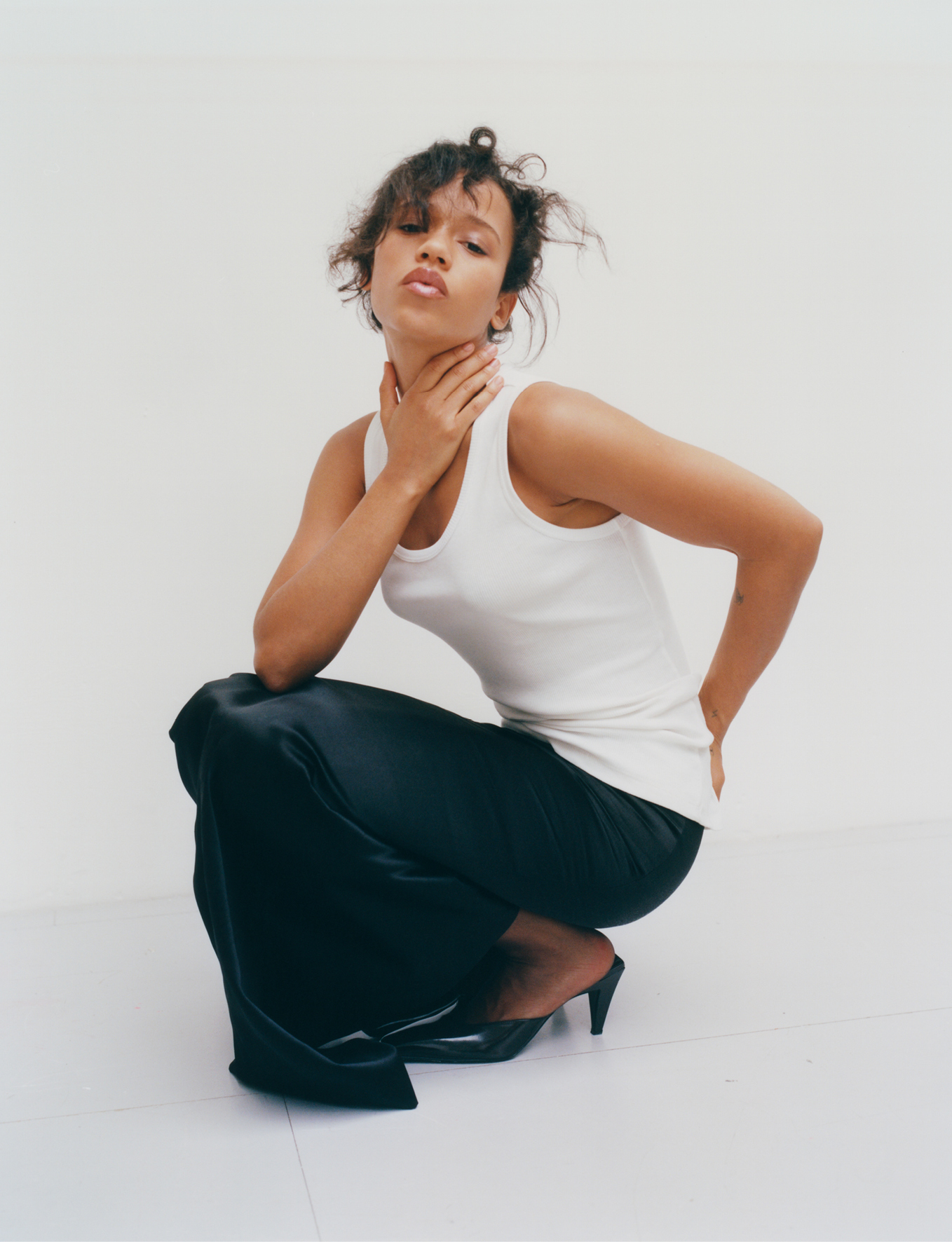
Taylor wears skirt and shoes GUCCI, vest stylist’s own and socks WOLFORD
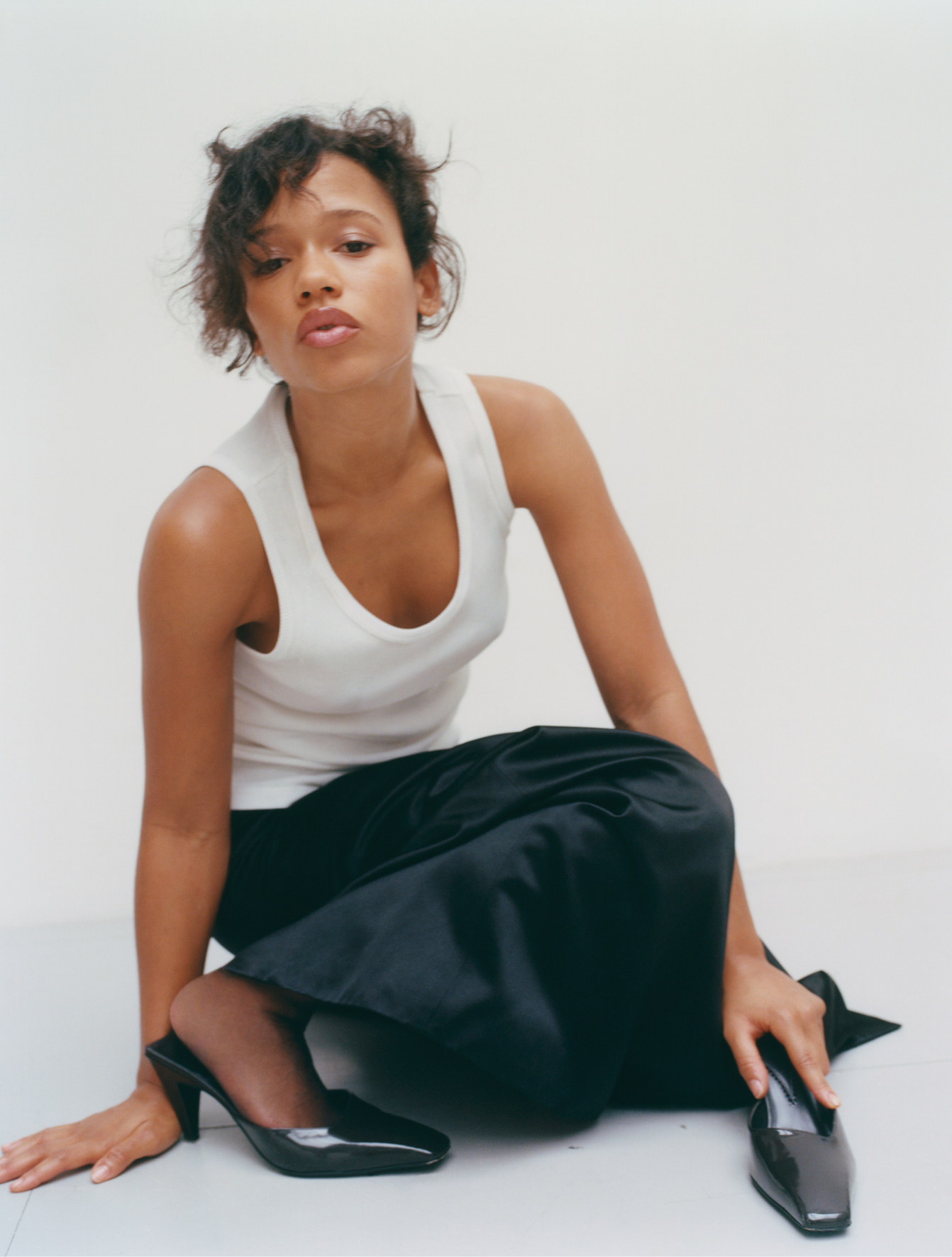
Taylor wears skirt and shoes GUCCI, vest stylist’s own and socks WOLFORD
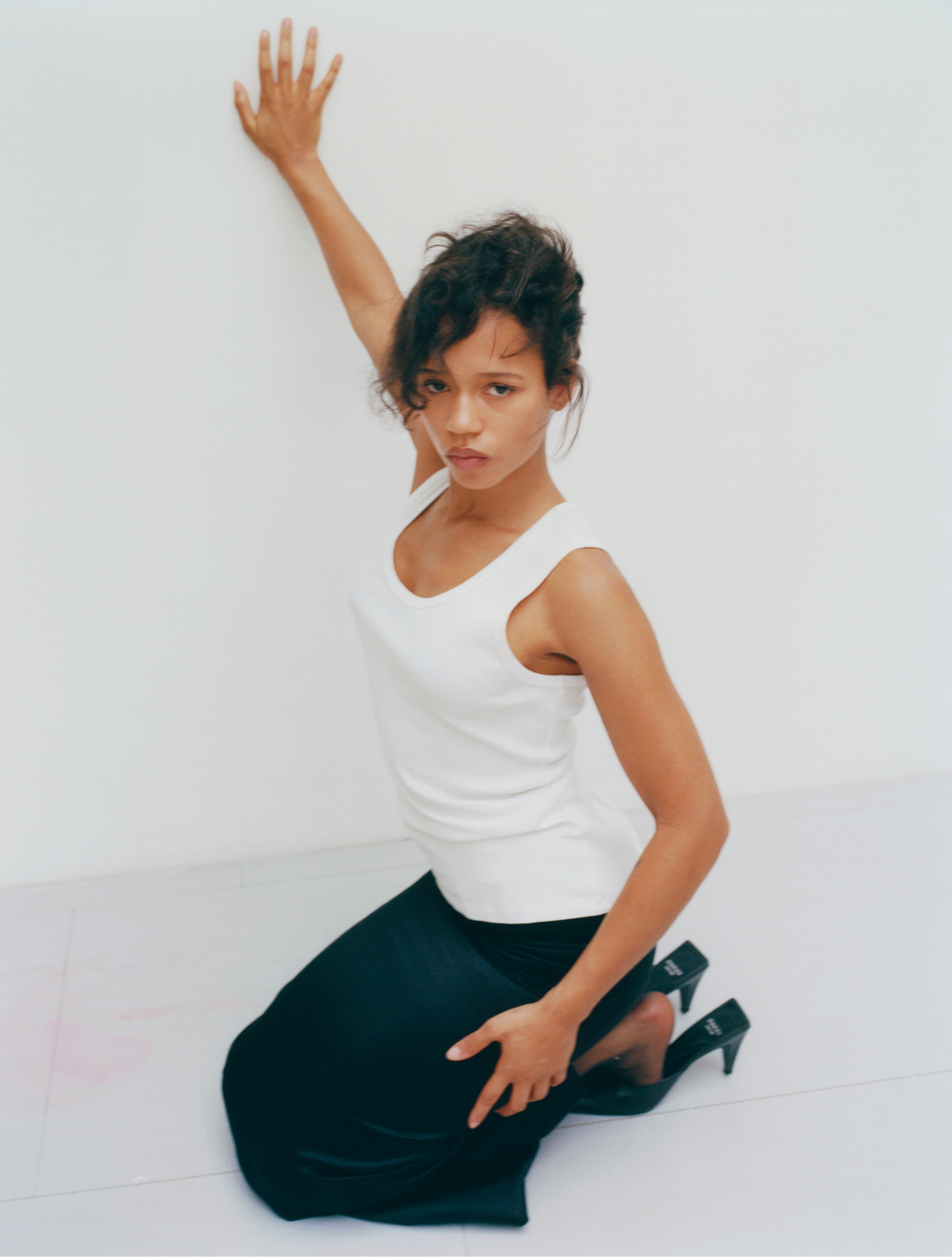
Taylor wears skirt and shoes GUCCI, vest stylist’s own and socks WOLFORD
As you were saying before, just making sure you’re not causing too much trouble because of what might happen. Is that something that you’ve experienced, either professionally or personally? Or do you feel like that’s not something that troubles you?
It definitely troubles me. Also, culturally, in Canada, it’s such a cliché being a Canadian but it is very true – you do say sorry all the time.
Right.
And then, being a woman. But sometimes, even now, I question a lot of the time, like, “Oh, when I’m just being me, when I’m not trying to be the most polite version of myself, does that mean I’m not a good person and should I apologise for that?”
Yeah.
And then when you are your full self and you’re with people that love you and you have true intimacy with, and they’re like, “Oh my God, I love being with you. I love this version of you, you feel so different today.” And you’re like, “Oh wow, it’s because I don’t have all the blocks that I’ve created that are, I don’t know, maybe coming from personal stuff?” But also just coming from how I think I need to be in the world to be accepted. That’s a really loving act and I’ve been experiencing that lately.
That’s wonderful, though, and it says something about the people you’re around as well because it reflects very well on them that they’re seeing that, don’t you think?
Yeah, I mean, I guess so. It is one of those things where you look in the mirror and you’re like, “Oh, should I unravel a little bit more then? How much can I unravel? How much can I be?”
How much can I be?
How much can I be and still be loved by the people that I love.
Right, yeah, the fear that you’ll be too much, or too yourself or something, and then that love will be withdrawn?
Yeah, and it is with Connie, too. The levels with her are what I am finding really interesting to discover. Because there are certain times where she’s just so behind so many different doors and closed off in a lot of ways. Who knows if anybody in her life has really seen her? And at the same time, there’s this deep wildness within her that is getting unleashed through love, through the drugs, through different personalities igniting one another. I think about what it means to love someone in what they are reflecting back to you about yourself, and what her and [the character of] Tristan [played by Paapa Essiedu] bring out of each other. But I feel like Connie is still very much a mystery to me right now. It’s been different every night.
But that’s fun. I mean, then there’s stuff to work out. The last thing you want is for the play to feel inert to you or solved. That would be dangerous. It’s interesting you bring up Canada and also wildness. Do you remember the very first time we spoke on a Zoom? When we were meeting for the first time you recommended a book to me, do you remember?
Yes!
It’s amazing. I started reading it and it’s really great.
Did you?
I didn’t realise it would be so much about psychoanalysis. Do you wanna say a tiny bit about the book? You don’t have to.
It’s called Women Who Run with the Wolves [Myths and Stories of the Wild Woman Archetype] by Clarissa Pinkola Estes. I’ve told so many people to read it, mostly my friends who have daughters who are around 10 to 15. Maybe 10 is a bit too early, but I wish I had had that book in my early adolescence as a woman growing up. It is so important at the beginning of being a woman in the world, and developing your brain and your body, and how the world perceives you, to have a good hold on your intuition and your voice, and not lose that or give it to other people to tell you what you should do. The book is really about that to me. It talks about keeping one’s own intuition, just being a woman in the world, but through these different fables, and then it dissects their message. It’s incredible story-telling. It’s a pivotal book to read in a woman’s life and I’m happy that I have it now.
Yeah, exactly. I found it wonderful. So, your adolescence, when you wish you’d read this book, was presumably spent in Canada, is that right?
Uh-huh.

Taylor wears dress, tights, socks and shoes MARC JACOBS and gloves DENTS
What’s your memory of yourself, then, when you think about who you were? I’m thinking about Connie and her youth. I could imagine what sort of adolescent she probably was and I wonder, when you look back, what emotions do you remember feeling?
Well, thanks for asking that. You know, it’s funny – I don’t have so many memories of my childhood. But with doing this play right now, something is happening in my life in that I have a lot of people who knew me when I was younger coming [back up], who I haven’t talked to for years. They’re telling me these stories about me as a child, sending me these messages saying, “I can’t believe you’re doing this play because I remember you as a child and you were like this, this and this.” And telling me stories about myself at that time that I don’t remember at all. I don’t know what it would feel like for them watching me do this.
As in do this play?
Yeah, I guess because I’m not British and I haven’t… I mean, I’m not trained at all, which is not something that I feel pride in. I feel very self-conscious about that.
You do?
Yes, I mean, yes, of course! All the actors that I’m working with right now that are so talented are trained. And I guess nothing is better or worse, but I do [feel like that]. I think anybody who hasn’t gone to university or college has some sort of complex about that, somewhat. Maybe some people don’t. A lot of people I talk to who haven’t [been to university] do, especially as an actor. Oh my gosh, it can all be so self-indulgent anyways. As in: am I doing something meaningful in the world? Have I exercised my brain in the way that I could? Am I using it to its fullest capacity? I guess that’s the due diligence that you do in your work, which I really try to work on, and within researching characters and whatever script or play you’re doing.
Do you recognise the child they are telling you about?
So, yeah, my aunt, she messaged me yesterday and said, “I can’t believe that you’re doing this play in London at The National and when you were a little kid…” I was 12 years old and I had this idea in my head that I could play the bass guitar. I had never played the bass guitar before, I don’t know why I had the idea in my head. Everyone was playing the clarinet and I was like, “I’m going to play the bass guitar.” So, I got a bass guitar and an amp, and I was like 80 pounds on the bus bringing this. All the highschoolers were on the bus, and I had this huge guitar on my back, and the amp. I would carry it on the bus to school every day. I just thought that I could do it.
So, she was telling me this story and was like, “And then you got up in front of the class and you couldn’t play it the way you thought you could, but the thing is you believed that you could so much. I guess it speaks to some part of you. You go and do something because you believe you can do it.” I was thinking it was quite a demented thing about me, like there’s something missing in my brain where I think, oh, I can do this.
I mean, this happened to me when I was first acting, too. I auditioned for this movie to play an Olympic swimmer. I’m not even a great swimmer. I can swim, but… In the audition they were like, “Can you do this?” And I said, “Of course I can!” Then I called my mom after and said, “How good of a swimmer do you think I am if I get this role?” And she’s like, “Not good.”
Oh, that’s hilarious.
So, I don’t know, I’m not like, “Oh yeah, it’s amazing that I just do all of these things.” But I kind of just do them because I believe I can, and there’s no basis [for thinking] if I actually can or not. I just decide that I will.
It’s a great image, though. This tiny you with this huge guitar and huge amp, lugging it around. What an interesting thing for your aunt to say, because she’s saying you’re trying to do something big, right? Is that what she meant by it, do you think?
I mean, it’s hard to say that about yourself, but I guess.
“The tax on a real relationship is the reality that you will get hurt, you will [have] grief, something will be lost at some point, and that’s OK. It’s worth it”
TAYLOR RUSSELL
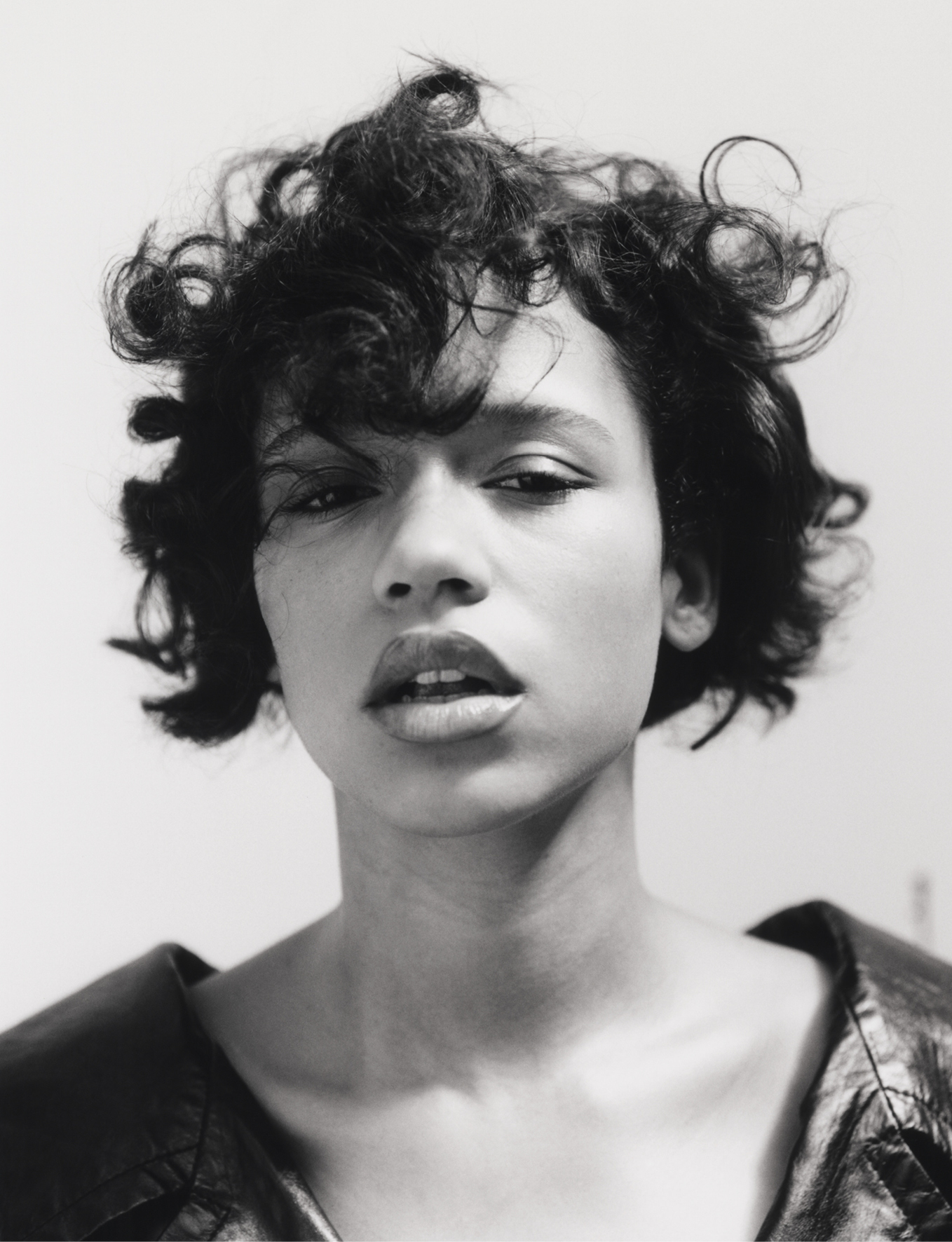
Taylor wears coat GUCCI
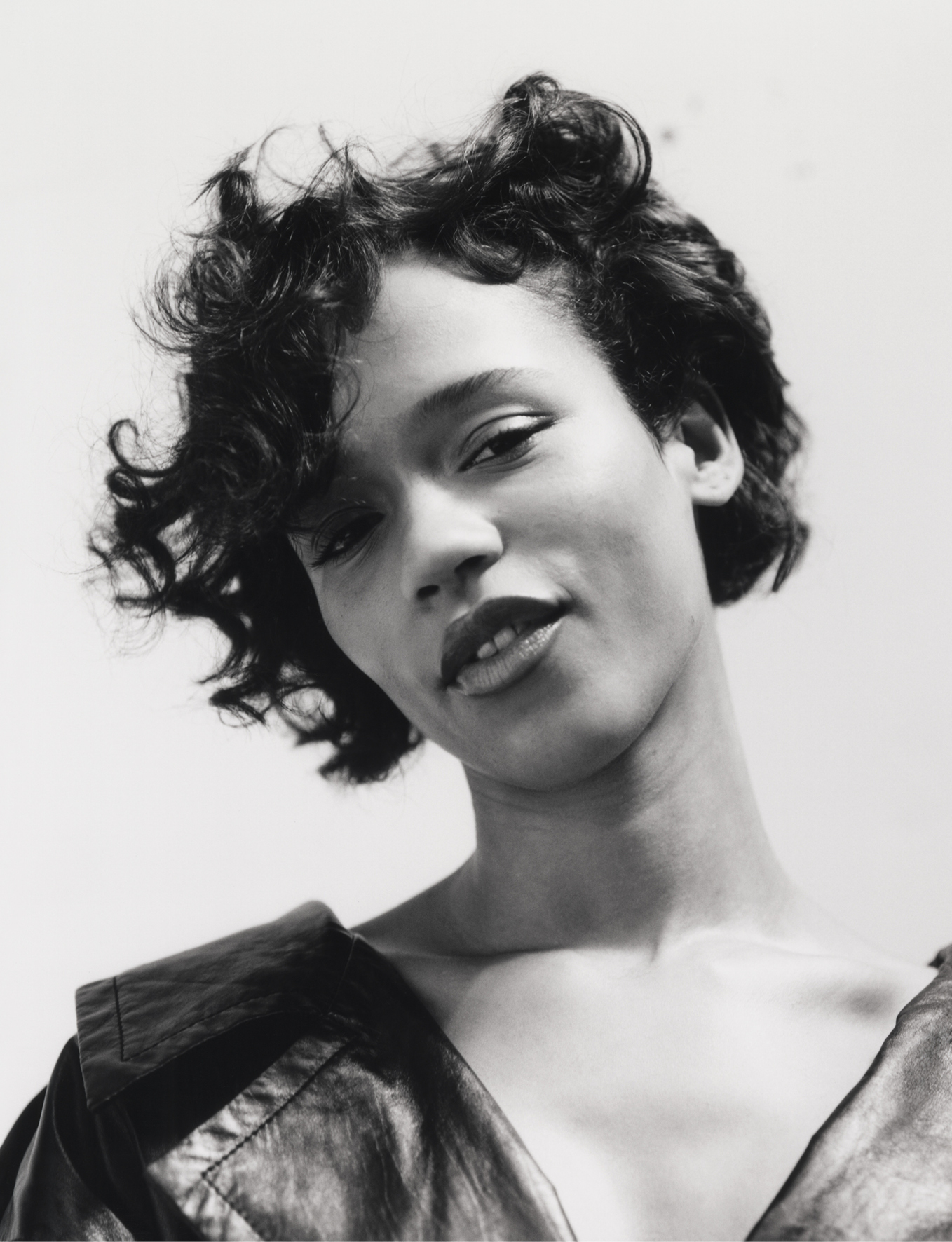
Taylor wears coat GUCCI
Do you know what you would be doing if you weren’t an actor? Is there another version of you in your head?
There’s, like, 50 versions of me in my head, of what I could be doing. I wanna know what you would be doing, too.
Yeah, I sympathise with that, totally. Well, I had this thing when I started out in my twenties when I basically applied to a lot of law schools. I had all my applications under my bed, really properly quite complicated applications, and I gave myself a year for anything to happen as a writer. I was 23 or something. “If I get anything happening professionally in this year, then I’m going to be a writer.” That was a rule I set myself and if I don’t [make it], I’m going to go to law school. That was a structured thing that I decided, and in that year I got a small play on at a 90-seat theatre. I kept the law school application forms under my bed until I was about 35, because I was so unsure [about] whether that would be the right thing to do. There’s this part of me, and maybe it’s similar to what you were talking about [with] acting, that wants to make sure I’m doing the best thing that I can do. I want to be helpful and I want to live meaningfully. Sometimes there can be friction with that.
Yeah.
And so, there’s always a part of me that has a feeling of: would it have been better to do something rather than write about it? I’m also aware that I’m proud of my work and stuff. I’m not disparaging it, but do you know what I mean?
Totally. The two things meet each other all the time, but I think we all believe this exact same thing. As corny as it sounds, we were saying that we believe art can change the world and the work that we’re doing can because storytelling is everything. We tell stories all the time. Our day is a story, our relationships are a story we’re telling ourselves.
Oh yeah, for sure!
Everything is just a story, right? To me, it seems so obvious that what you’re doing is meaningful work, because you are researching and using somebody’s real life and showing it to people in a way that it can be taken in and felt and received. That’s really important.
Thank you, that’s meaningful. I do think that is part of what we do, whether that is the writing or the acting or directing or a combination of all of them. I think, from what I’ve also read about you, you’re an artist in many ways. It feels like you’ve written and directed as well, right? Do you think of yourself primarily as an actor, or as an artist who acts most of the time?
To be quite honest, yeah, I would say the latter. I love acting, I am fascinated by the craft of acting. I love actors and I love talking to actors about why they love acting. I was talking to [Effect co-star] Kobna [Holdbrook-Smith] about why he loves acting, and I loved his response to it. He is so eloquent, there is no way I am ever going to do him justice, but he was talking about how he’s very curious and loves research and loves to be able to flex that muscle within acting and dissect something in that way. I want the stories that I’m a part of to feel like they have a deep purpose. That doesn’t happen all the time – just because that’s life, it’s not always going to be meaningful. That’s fine. I don’t think it’s that practical of me to believe that I can be a part of [stories that are] earth-shattering in my heart and body and brain all the time.
So, when I think about that, I think about what else am I interested in? There are so many different things that I want to do. Right now, with acting, I love it, I want to act. I want to be in stories and I love being in [a] community. That’s what’s incredible about doing this production. This community that we are a part of is so beautiful and held in this special little container. There’s so much love and respect and I love that feeling on set. I just want to go where that is, you know?
I completely understand that and that’s a big driver for me as well, that sense of being held by something or belonging. The creation of a family, a professional family, over and over again, drives me a lot artistically. Can I ask, how trusting are you as a person? Then I guess a separate question that I was thinking about was what makes you feel safe? Would you describe yourself as trusting people easily?
It comes and goes. It’s something that has been a big part of my life this past year. I mean, it’s been a big part of my life since I can remember, because I really want to live an open life and meet somebody and be real and honest and truthful with them. You can’t really live an open life if you aren’t sharing of yourself while you ask another person to share of themselves with you. But I’ve found it increasingly harder to do that, and I’m trying to challenge myself in that way right now. My experience the past couple of years, [with] people I’ve really trusted, things weren’t held in a way that I would’ve appreciated them to be held. And so, that has changed things in me a little bit.
I’m already a homebody. If it’s not for work, I’m not somebody who is going to be at things purely because I have anxieties in the ways that I do, in the ways that we all do, which is not unique. Now I’m living in London, and when I came here I was like, “You know what, Taylor, this is a new place. You’re not in America, not in Canada. You have to open up and allow people to know you. You’re going to be in a community of people that are going to be there for you. You have to allow them to know you. If something happens, something happens, that’s life. You are going to be hurt – that’s the tax. The tax on a real relationship is the reality that you will get hurt, you will [have] grief, something will be lost at some point and that’s OK. It’s worth it.” It’s something that I’m having to remind myself a lot.

Taylor wears dress GUCCI
That’s very wise. It’s very wise and [it’s] difficult sometimes, I think. I relate to that. I keep thinking about you on the bus with that bass guitar. It’s worth it, you know, to try. Talk to me about how you found the city and what it’s doing for you at the moment, if anything? Bad or good?
Well, my dad is British, his parents were in the Windrush generation – they came from Jamaica to England. He lived here until he was seven and then they moved to Montreal. My grandpa’s a pastor and so [we’re a] church-going family. They still have a bunch of churches in Jamaica and they have a church in Montreal. I always had these dreams of London, of living here. I’d never been before. Probably the first time I came to London was in 2019.
Every time I’ve touched down here [since], it felt like I was at home. I mean, I have a lot of extended family here, but I just always had the sense as a little girl that I would live in London at some point, or that it would be home to me. I hadn’t really felt at home anywhere I’ve lived fully. In New York I felt that the most, probably out of anywhere in the world. Now, I feel that here. I feel at peace in a lot of ways. I’m meeting incredible people. I feel there were parts of my life that were dormant that [now] feel very ignited, which haven’t for years and years and years. I know I’m being vague with what I’m saying…
You don’t have to be more specific, but it’s intriguing.
Certain aspects of one’s life that are dormant get picked up again. I can’t believe I’m doing a play here. Not just doing a play but I’m doing your play. I admire your writing so much and I admire Jamie so much. He is an incredible director. And Paapa, Michelle [Austin] and Kobna, and all of our company. It just feels like the best possible group that I could be with and it goes past my dreams of what my acting life could be like.
That’s great.
That feels incredible. I guess it’s one of those things when life feels synchronised – you know you’re in the right place.
Yeah, and having that sensation of being in the centre of your life somehow, which I’ve felt over the last couple of years. That feeling that you’re sitting in the centre of your life and things are available to you. I feel really grateful for that.
You feel that?
I do. I really do, yeah. And I didn’t for a long time. It’s a lovely thing to have at this age, at my age, which is forties. I’m really inspired and happy. What age do you feel inside? What age resonates with you?
Honestly, I always dream about wanting to be in my forties and fifties, and I can’t wait until I’m at that point. I have a lot of friends who are around that age and, I don’t know, I might have some ideas around it that aren’t true, which is a great possibility. Being young and thinking, you know, things will align at a certain age or time. Things will feel a little bit more settled, perhaps. Is that true, do you feel that?
I definitely do feel more settled, but there’s always going to be a part of me that I want to not feel trapped.
Yes.
It’s a big trigger for me.
Same.
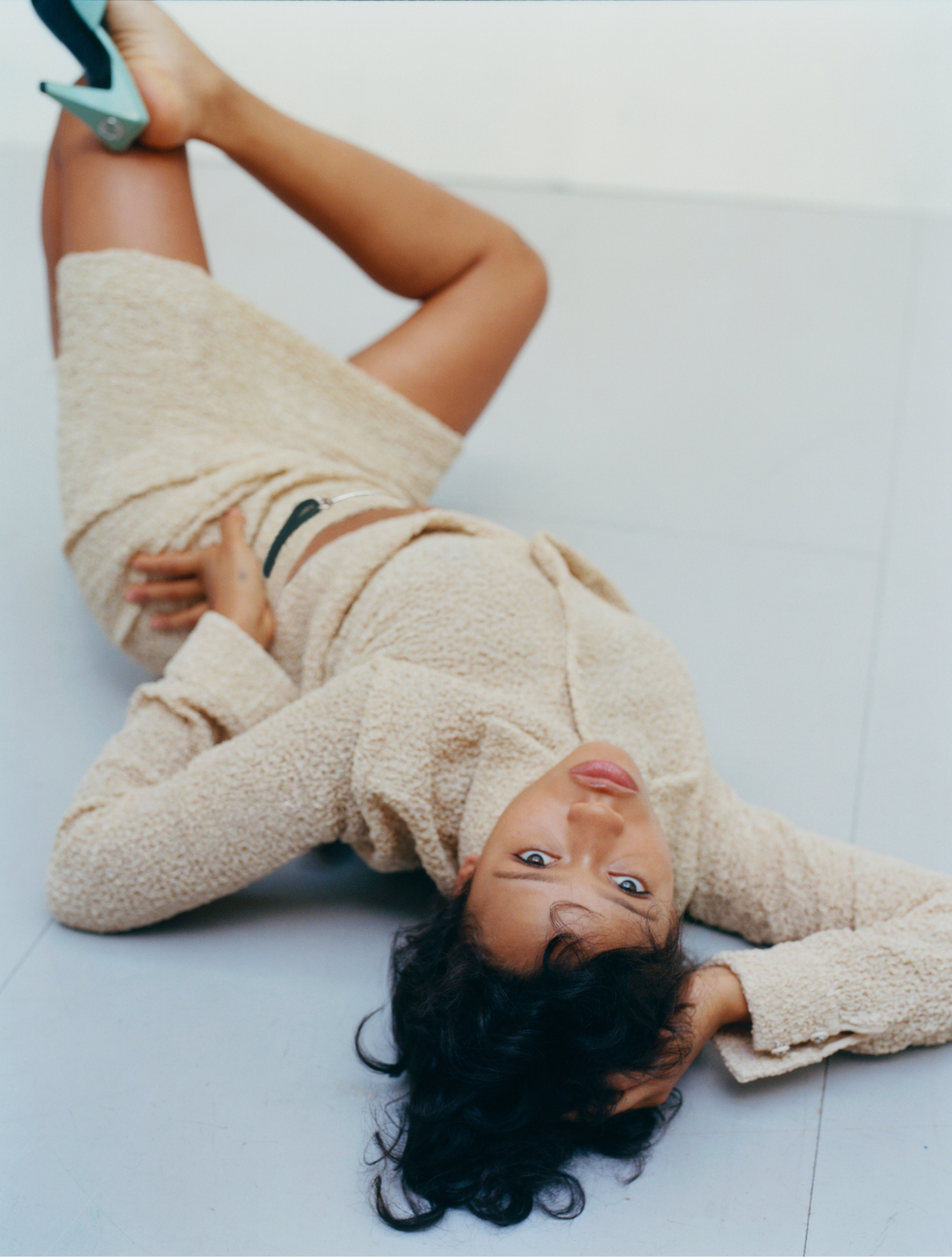
Taylor wears top, skirt, belt and shoes GUCCI
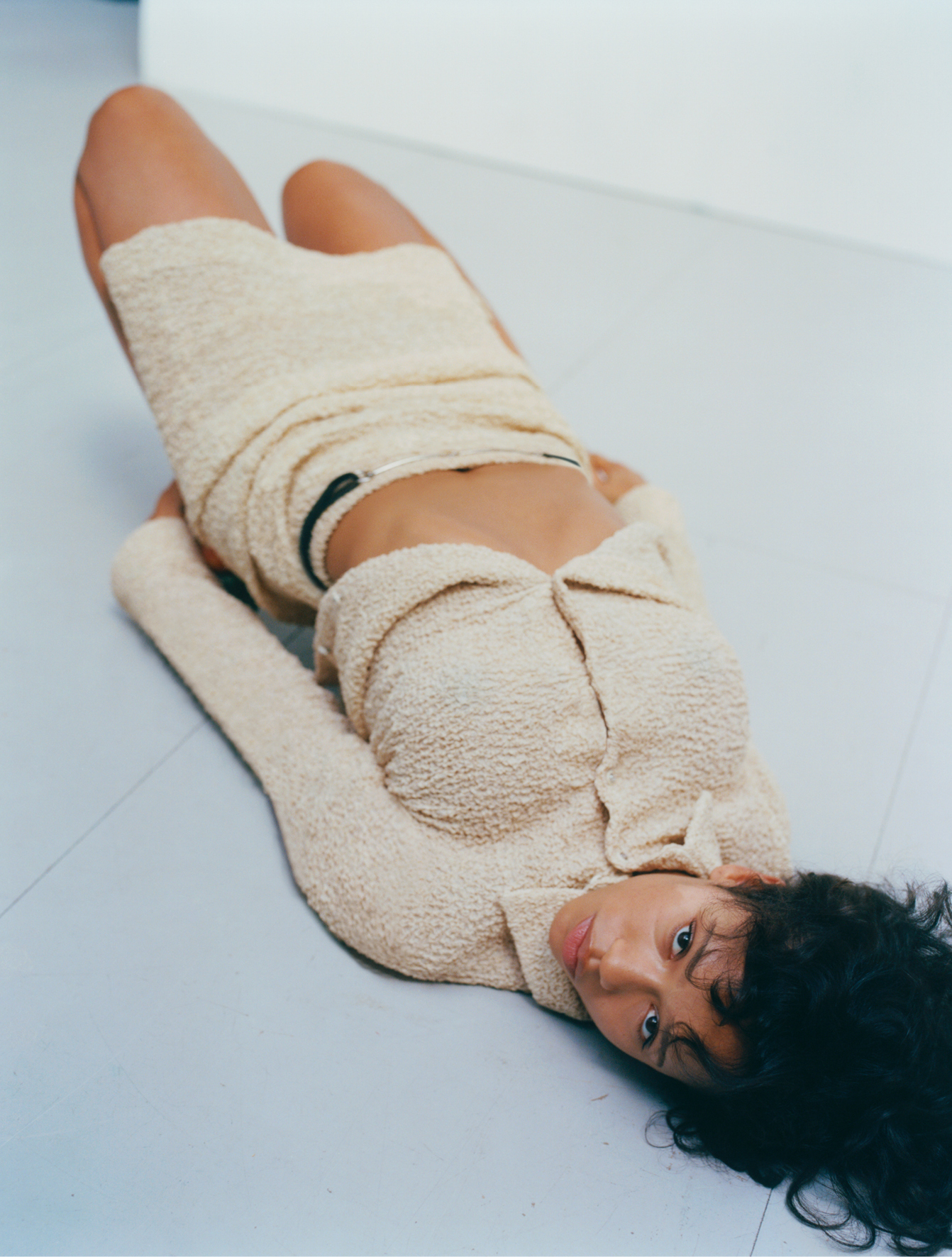
Taylor wears top, skirt, belt and shoes GUCCI
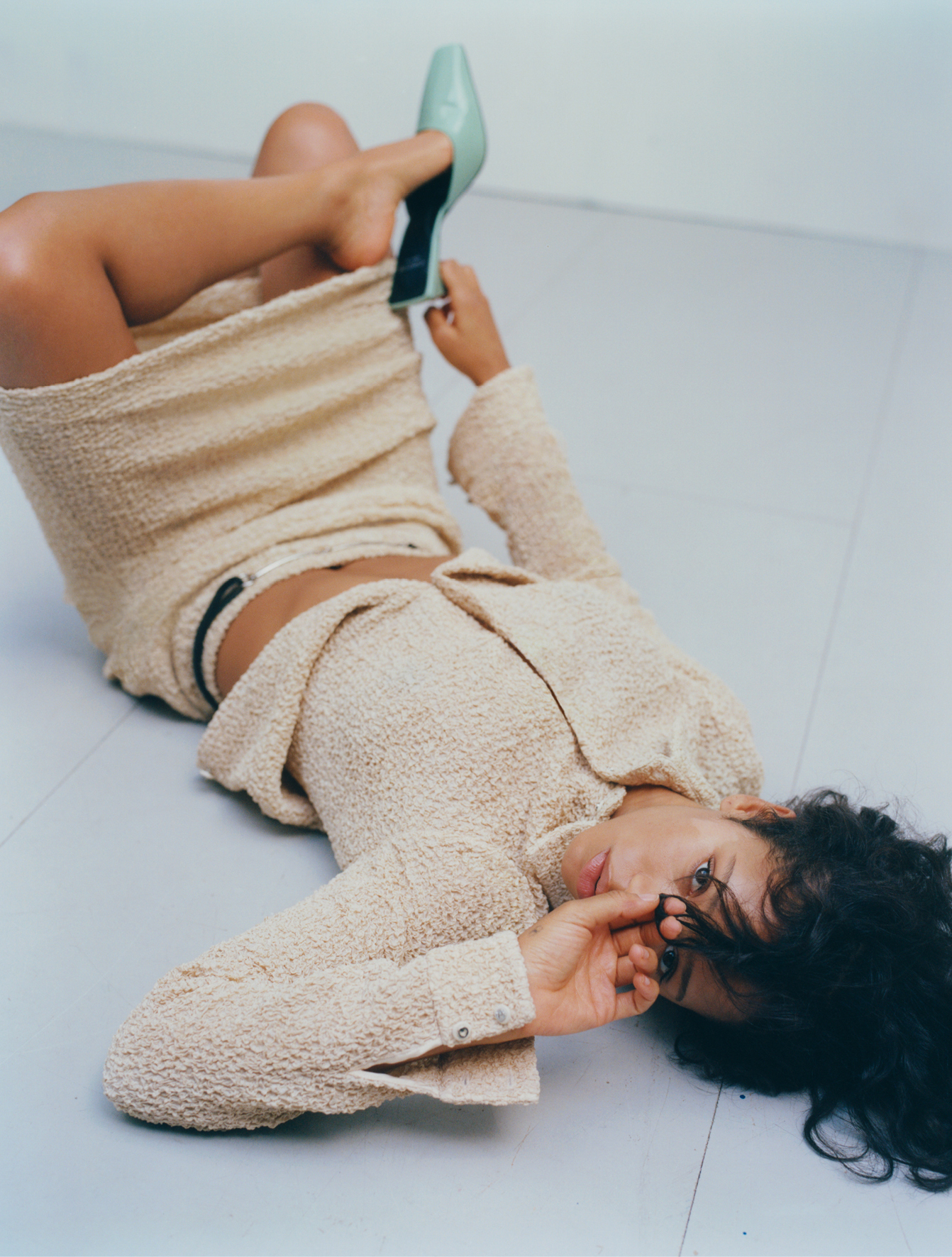
Taylor wears top, skirt, belt and shoes GUCCI
“When I think about when I feel the best creatively, it’s me not having showered for days, covered in dirt and laying in the grass with nobody knowing where I am”
TAYLOR RUSSELL
I’m very aware that that’s the biggest mistake I could make – to settle to the extent that I start to freak out and begin to feel trapped. That’s something that I always have to watch for.
OK, I would love to talk about this with you. You’re doing this part of your life now. You’re pregnant, you have a partner and you’re in love. How do those two things collide? Do you have anxieties about this because of that part of you, and how are you thinking about it?
Oh, absolutely. I have anxieties about it. I mean, what I feel very strongly about is not denying feeling lots of things, because I think it’s dangerous to do that. It always comes back and bites you. I feel incredibly happy and grateful and excited about being pregnant and having a child. But I also feel a huge amount of responsibility around it, and somewhat anxious. I’m frightened in some ways as well, partly about what the physical experience of that is and the risks involved with it. But also the responsibility for the rest of one’s life. I feel all of those things and all of those things are appropriate to feel. I’d be more worried if I didn’t feel some of those [things], because I think it would show a disrespect to the size of the project, if you see what I mean?
I love that description of it: “the size of the project”.
You know, the creation of a human being, which is often just perceived as something that is so normal and standard and almost bourgeois, and actually it’s immense.
Yeah. I relate so heavily to what you are saying in your feelings about relationships. I have a few friends in their forties who are in relationships, who just have had babies, who feel similarly like, “OK, I have this thing with being trapped, and I feel deeply in my soul like I’m a free spirit and I need to be free and that feels really right to me.”
When I think about when I feel the best creatively, it’s me not having showered for days, being covered in dirt and laying in the grass with nobody knowing where I am. My phone being underwater, feeling like I’ve just run around and I have twigs in my hair and I’m a total mess. I think that image reflects that I just want to feel like I don’t need to have anything buttoned up or kept, that it all can just be disgusting and smelly and gross. And that I’m not doing it for anyone but for me, which is the freedom [of] feeling like I don’t owe it to anybody but myself.
Yeah, I do relate to that. That’s a great image to come up with, artistically. I have similar things.
What’s yours?
Well, it’s similar in the sense that there’s a stage of writing you can get to when you’re trying to hit a deadline and you haven’t slept. You stink because you don’t feel like you’ve got the time to have a bath – you probably do, but you’re thinking, I can’t interrupt this, I need to do this, why is this not working? And you’re so inside of the experience of writing that you can smell it. It’s a bit like that, where your body starts to stink and you’re like, “God, if someone comes… I haven’t spoken to anyone in days.”
Yes.
When you’re in love with something, that’s the only thing you can think about or see. I feel like we should do a few shorter questions for fun, simply to make sure that it’s not all [serious]. Although this next one is quite deep. Therapy, yes or no?
Yes.
Very good. Very good. I have this theory, and this is kind of related to the play, that when you’re in a state it’s hard to imagine being in the opposite state. Would you rather be too hot or too cold, if you had to be one?
Oh my God, I hate being cold. I guess, this is the battle.
When you’re too anything, it’s bad.
If you’re too anything, it’s bad. If you’re cold you can always layer, you can always get yourself warm.

Taylor wears vest stylist's own
Which moment in the play is resonating with you personally the most? It doesn’t have to be a moment you play, but obviously it can be.
Oh yeah, there is. At the end, when we’re in the memory slippage of time in the hospital… Days are folding into one another. The very end of that piece when I’m getting angry at him and I’m saying, “This is where we are! This is where we are! This is where we are! Why don’t you understand? Why don’t you remember me?” And [I’m] losing my patience. And then he asks me, “Do I love you?” And I say, “I don’t know, do you?”.
Aw, that’s beautiful. We didn’t get around to this, so let’s do it as a short question: what makes you feel safe? What’s your instant thought?
My instant thought on feeling safe: it’s all about people, being with the people that I feel I can be naked with, be a person with, and not have to be anything except for whatever mood I’m in.
That’s nice. What makes you feel loved?
Being checked in on.
That’s so nice because it’s so simple. What I love about that is that you can just tell someone and they can do it. It’s not some really vague hope. That’s doable for a partner, to just be like: “Are you doing OK? How’s that going?” That’s a really lovely answer.
It’s underrated, I think.
Oh my God, so underrated because it’s so easy to do and a lot of people don’t do it. Because the implication, if you don’t do it, is also that you don’t really matter. That is what is being said a little bit if no one bothers to check in.
I feel like you’re probably the same, but maybe you’re not… I’m never going to be volunteering all of my feelings. I’m somebody who, annoyingly, complicatedly, needs things to be asked and pulled from me to talk about it. But even then I’m like, “I’m sorry, is this too much? Is this too much?” So I need a partner who is going to do that or else it’s never going to work.
I am the same. I’m terrible for that. Also, even when I’m asked, I will often just immediately parry [the question].
It’s weird. It’s like that thing when you feel vulnerable or on display for saying something, or talking too much or whatever. Saying something about yourself and then feeling like, “Oh no, I shouldn’t be talking about myself. I should be asking about you, because that’s the thing I should be doing and it’s not that interesting. We don’t need to talk about me, don’t worry. I’ll handle it.”
Oh God, totally. “I’ll handle it, don’t worry.” That’ll be [on] my gravestone.
Lucy Prebble and Taylor Russell, on [their] gravestone: “I’ll handle it.”
“I wanna be 60, 70, 80 doing shrooms and molly. Like, on an island doing shrooms and molly, naked, running around, drinking piña coladas”
TAYLOR RUSSELL
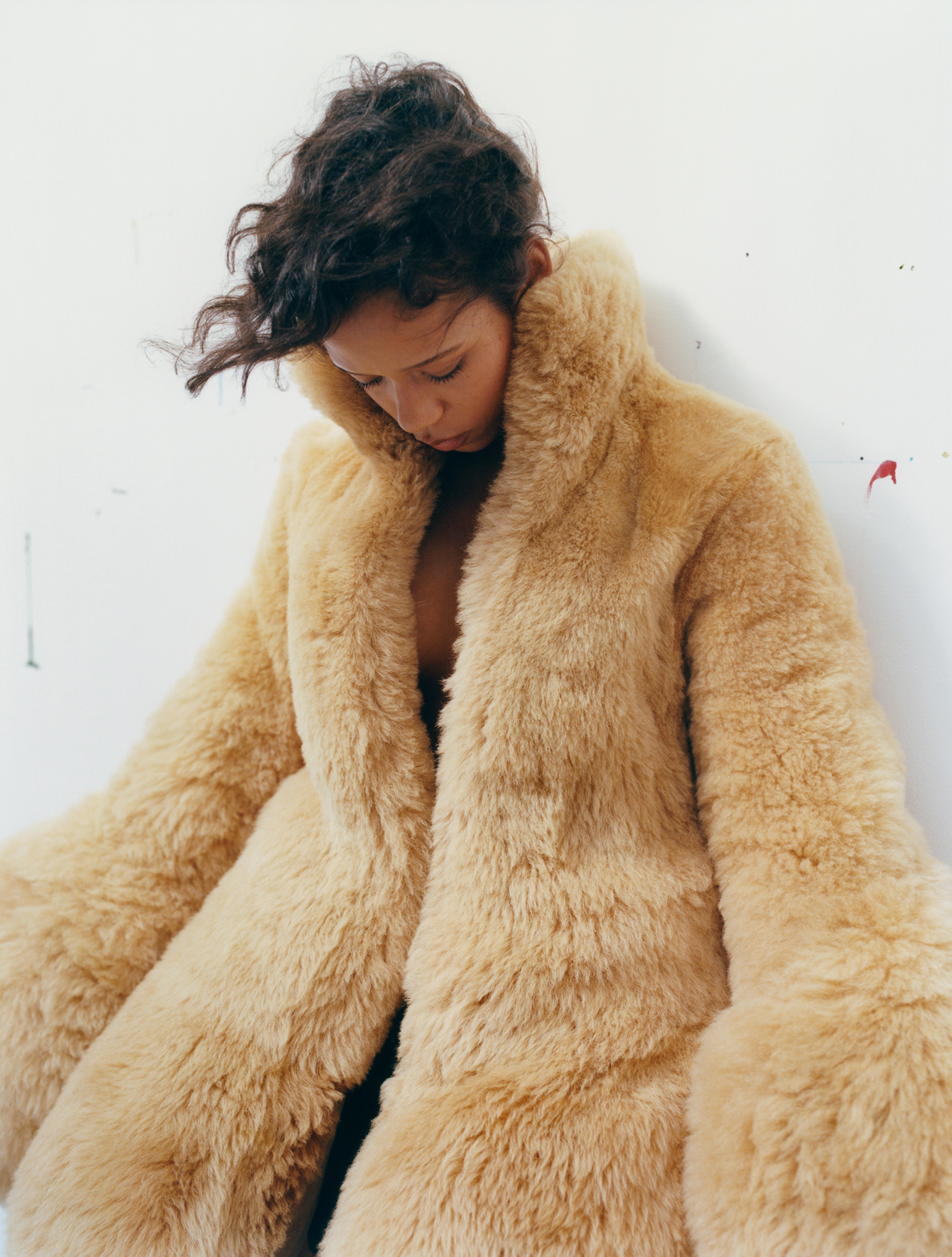
Taylor wears coat LOEWE
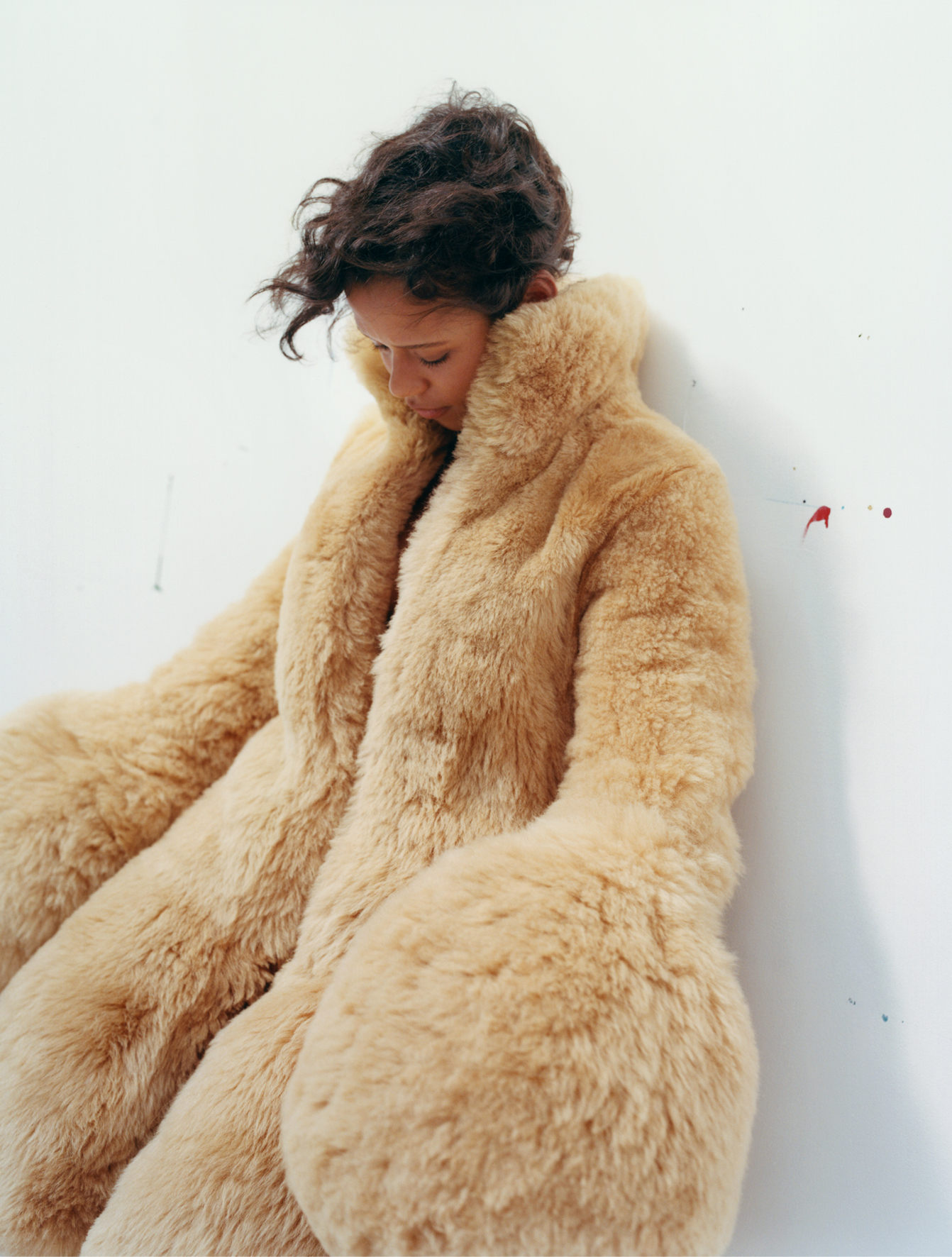
Taylor wears coat LOEWE
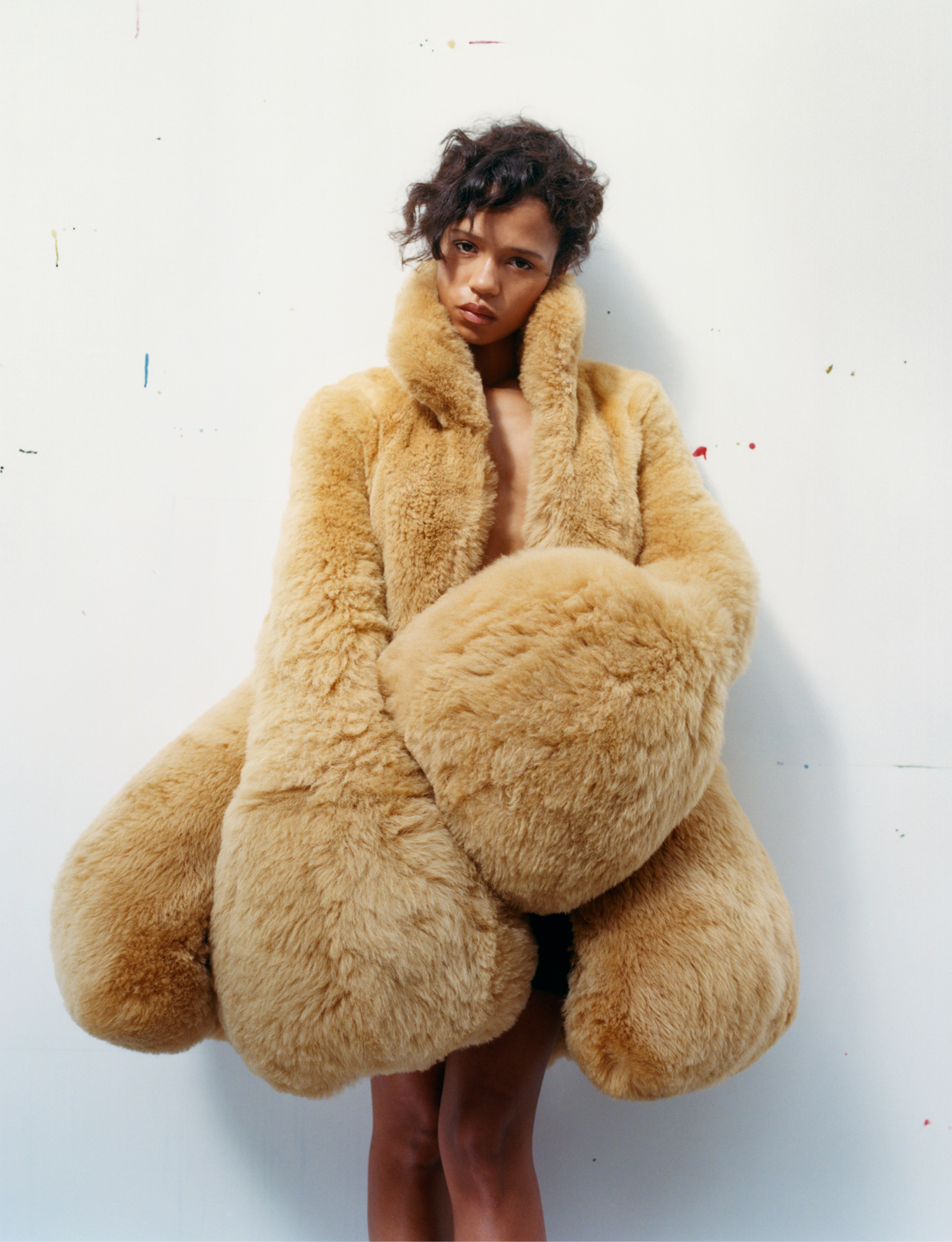
Taylor wears coat LOEWE
One thing about Connie is she’s super rational, that’s the role that she plays in the play. What’s your least rational belief?
Lately, when we’re on stage, under all of the lights, I keep thinking when we’re laying down that they’re all going to fall and smash and kill me. I have to keep thinking: “Oh no no no, it’s not going to happen, it’s not going to happen.” But that actually could happen…
I mean, I guess it could happen. We should check.
We should check. Shall we do that today?
We should be on top of that. I’m hoping there’s a guy who is in charge of that.
Right, because this is a fear.
And then we get to use the gravestone.
Oh, yeah! Will you do the same if I die immediately?
Oh yeah, immediately.
Actually, I don’t want that. I just want to say for the record, I don’t want that. I don’t want any dual deaths.
You want it to be all about you, is what you’re saying.
Such an actress.
Yeah, and it’s also a play that’s a lot about drugs. A fun question: what’s your favourite drug? Obviously, take that in whatever way that you want to take it.
What’s my favourite drug?
In life.
In life, what’s my favourite drug? Does love count?
Well, in our play, I guess that’s what it’s about, right?
I guess love. I mean, love, a lot of the time, feels like a drug, you feel so insane. Being with the person all the time, you’d do anything for them. You’re like, “I wanna have all of this stuff with you and I wanna do everything with you.” That feels like, especially when you’re not in love all the time… I have my distinct loves of my life and so I can remember the feelings of them pretty specifically and intensely.
Wow.
When I think about them, and being in love, it definitely feels like a drug. But honestly, I didn’t experiment with drugs much when I was a teenager and in my twenties.
I do say to my nephews and nieces – as the cool aunt – what I always say to them is, “Save something for when you’re older”, because seriously, if you’re lucky, it’s a long life…
I wanna be 60, 70, 80 doing shrooms and molly. Like on an island doing shrooms and molly, naked, running around, drinking piña coladas.
That sounds great, can I come?
Yeah! No, you’ll be there.
Great. I look forward to it.
And our children will just be picking up the pieces, saying: “Why is mom saying all this stuff about the universe?”
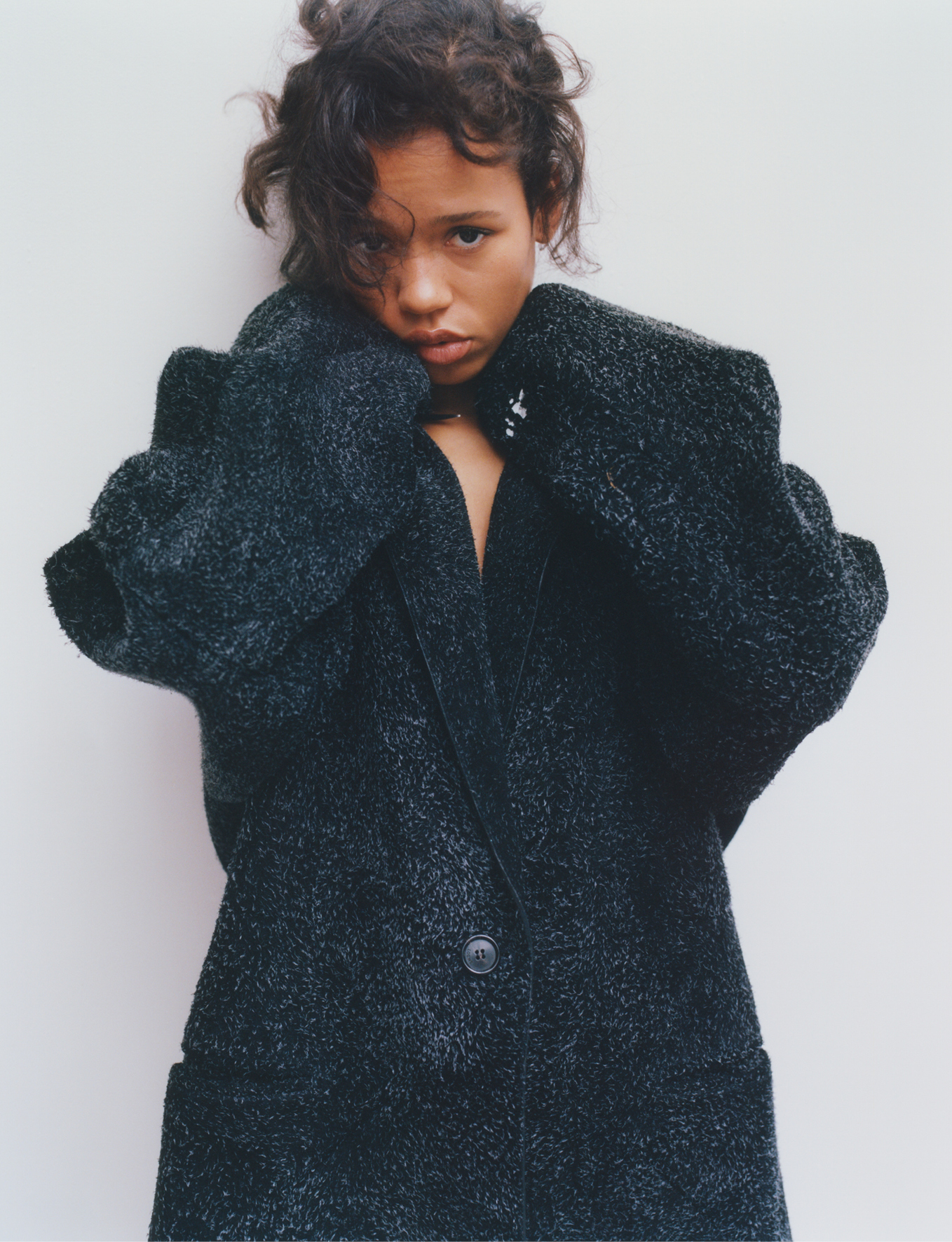
Taylor wears blazer LOEWE and necklace SHAUN LEANE
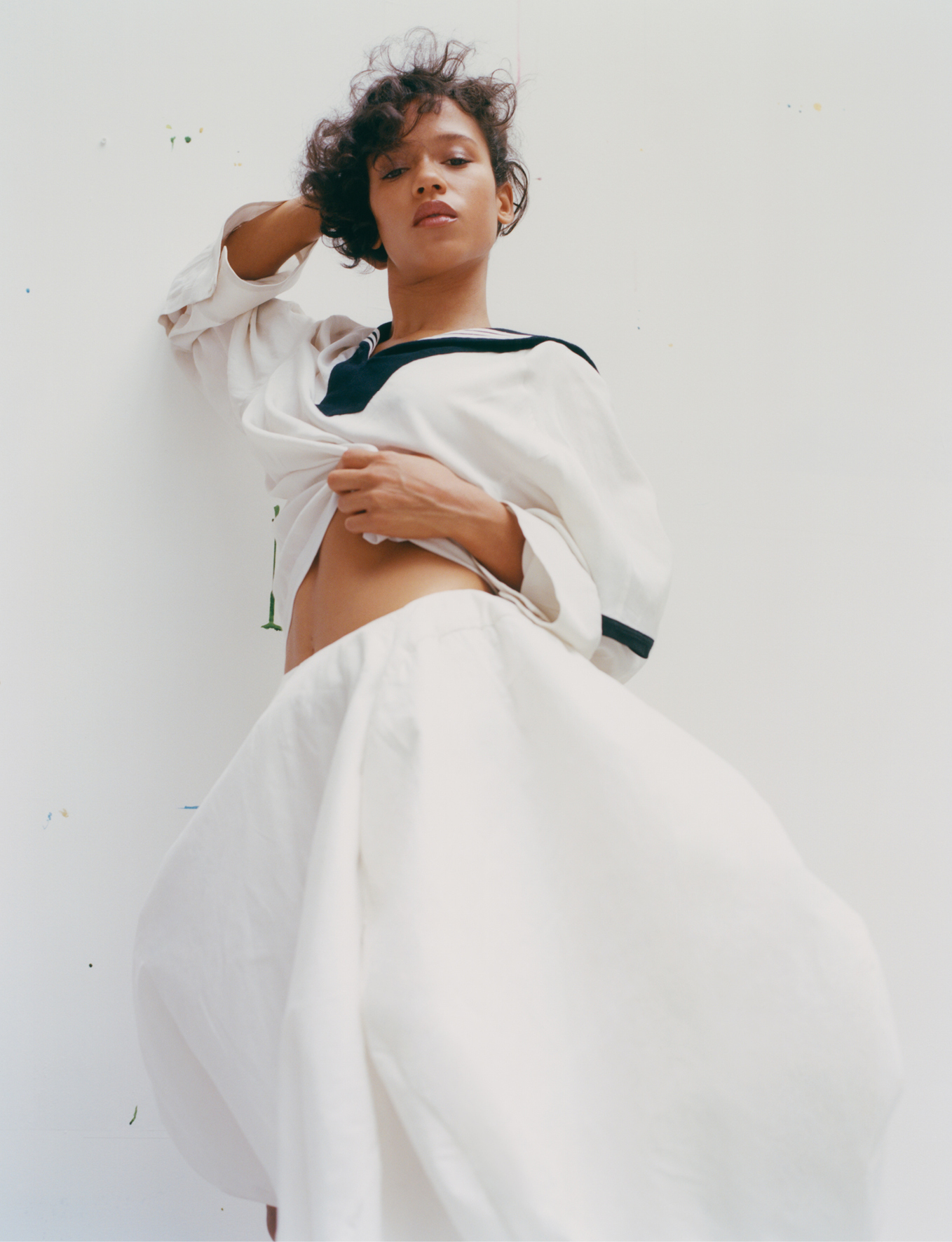
Taylor wears top archive YOHJI YAMAMOTO courtesy of 20age and skirt archive COMME DES GARÇONS courtesy of 20age
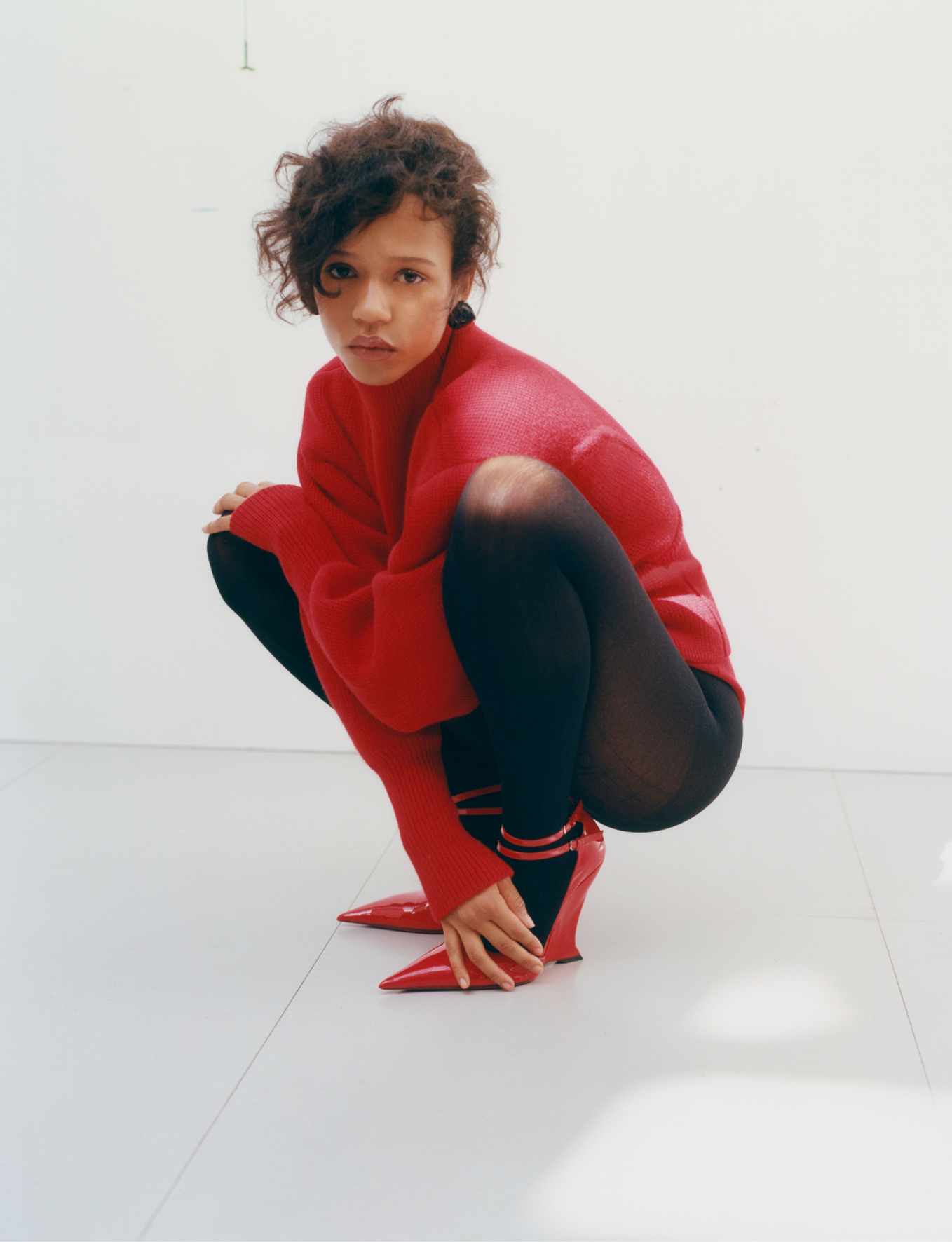
Taylor wears jumper, shorts, earrings, tights and shoes FERRAGAMO
CREDITS
HAIR Pål Berdhal MAKE-UP Victoria Martin MANICURIST Sabrina Gayle SET DESIGNER Hella Keck PRODUCTION Block Productions PRODUCER Rachael Evans PRODUCTION MANAGER Erin Shanahan TAILOR Gillian Ford PHOTO ASSISTANTS Vassili Boclé and Bradley Polkinghorne STYLING ASSISTANTS Borys Korban, Hollie Willamson and Stefania Gertis SET DESIGNER’S ASSISTANT Isaac Ashley PRODUCTION ASSISTANT Sophie Kanny















